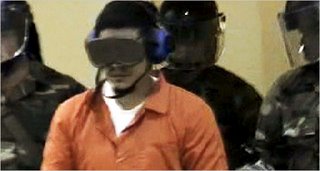Monday, December 04, 2006
Isolation As Mind Control Technique

There is a classified videotape that shows the outrageously excessive measures taken against "enemy combatant" Jose Padilla while in the custody of the U.S. military in South Carolina.
The military guards could not have been fearing for their lives. The use of isolation for mind-control purposes can be the only explanation.
Several guards in camouflage and riot gear approached cell No. 103. They unlocked a rectangular panel at the bottom of the door and Mr. Padilla's bare feet slid through, eerily disembodied. As one guard held down a foot with his black boot, the others shackled Mr. Padilla's legs. Next, his hands emerged through another hole to be manacled.
Wordlessly, the guards, pushing into the cell, chained Mr. Padilla's cuffed hands to a metal belt. Briefly, his expressionless eyes met the camera before he lowered his head submissively in expectation of what came next: noise-blocking headphones over his ears and blacked-out goggles over his eyes. Then the guards, whose faces were hidden behind plastic visors, marched their masked, clanking prisoner down the hall to his root canal.
Now lawyers for Mr. Padilla, 36, suggest that he is unfit to stand trial. They argue that he has been so damaged by his interrogations and prolonged isolation that he suffers post-traumatic stress disorder and is unable to assist in his own defense. His interrogations, they say, included hooding, stress positions, assaults, threats of imminent execution and the administration of "truth serums." ...
Mr. Padilla's situation, as an American declared an enemy combatant and held without charges by his own government, was extraordinary and the conditions of his detention appear to have been unprecedented in the military justice system.
Philip D. Cave, a former judge advocate general for the Navy and now a lawyer specializing in military law, said, "There's nothing comparable in terms of severity of confinement, in terms of how Padilla was held, especially considering that this was pretrial confinement." ...
Blackened goggles and earphones are rarely employed in internal prison transports in the United States, but riot gear is sometimes used for violent prisoners.

One of Mr. Padilla's lawyers, Orlando do Campo, said, however, that Mr. Padilla was a "completely docile" prisoner. "There was not one disciplinary problem with Jose ever, not one citation, not one act of disobedience," said Mr. do Campo, who is a lawyer at the Miami federal public defender's office.
In his affidavit, Mr. Patel said, "I was told by members of the brig staff that Mr. Padilla's temperament was so docile and inactive that his behavior was like that of 'a piece of furniture.' "
Federal prosecutors and defense lawyers are locked in a tug of war over the relevancy of Mr. Padilla's military detention to the present criminal case. Federal prosecutors have asked the judge to forbid Mr. Padilla's lawyers from mentioning the circumstances of his military detention during the trial, maintaining that their accusations could "distract and inflame the jury."
But defense lawyers say it is unconscionable to ignore Mr. Padilla's military detention because, among other reasons, it altered him in a way that will impinge on his trial.
Dr. Angela Hegarty, director of forensic psychiatry at the Creedmoor Psychiatric Center in Queens, N.Y., who examined Mr. Padilla for a total of 22 hours in June and September, said in an affidavit filed Friday that he "lacks the capacity to assist in his own defense."
"It is my opinion that as the result of his experiences during his detention and interrogation, Mr. Padilla does not appreciate the nature and consequences of the proceedings against him, is unable to render assistance to counsel, and has impairments in reasoning as the result of a mental illness, i.e., post-traumatic stress disorder, complicated by the neuropsychiatric effects of prolonged isolation," Dr. Hegarty said in an affidavit for the defense. ...
Mr. Padilla's status was abruptly changed to criminal defendant from enemy combatant last fall. At the time, the Supreme Court was weighing whether to take up the legality of his military detention -- and thus the issue of the president's authority to seize an American citizen on American soil and hold him indefinitely without charges -- when the Bush administration pre-empted its decision by filing criminal charges against Mr. Padilla.
Mr. Padilla was added as a defendant in a terrorism conspiracy case already under way in Miami. The strong public accusations made during his military detention -- about the dirty bomb, Al Qaeda connections and supposed plans to set off natural gas explosions in apartment buildings -- appear nowhere in the indictment against him. The indictment does not allege any specific violent plot against America.


